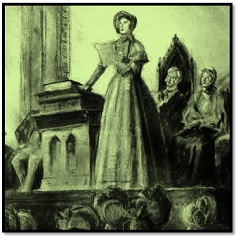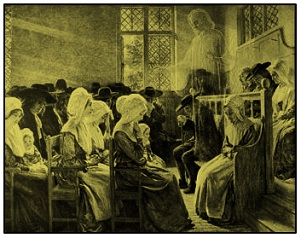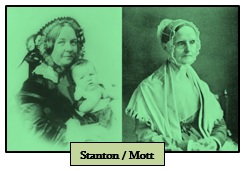Stuff You Don’t Really Want To Know (But For Some Reason Have To) About the Seneca Falls Convention (1848)…
Three Big Things:
 1. Lucretia Mott and Elizabeth Cady Stanton – Denied the right to participate in the first “World’s Anti-Slavery Convention” in London in 1840, Mott and Stanton decided that if women were to be effective reformers, they’d need more rights themselves. They spearheaded the first “women’s rights convention” on record in Seneca Falls, NY, eight years later.
1. Lucretia Mott and Elizabeth Cady Stanton – Denied the right to participate in the first “World’s Anti-Slavery Convention” in London in 1840, Mott and Stanton decided that if women were to be effective reformers, they’d need more rights themselves. They spearheaded the first “women’s rights convention” on record in Seneca Falls, NY, eight years later.
2. “The Declaration of Sentiments” – Modeled after the Declaration of Independence, this document (read at the convention) declared that “all men and women are created equal” and the “history of mankind is a history of repeated injuries and usurpations on the part of man toward woman.” It’s probably excerpted in the back of your textbook somewhere.
3. Controversy over Suffrage – Stanton was part of a contingent who wanted to push for women to be given the right to vote; Mott and other more cautious activists resisted, fearing it would be so unpopular as to harm their efforts overall. The resolution passed, however, despite having little impact on election laws at the time.
Background
The first half of the 19th century became a time of great social reform across the United States, although most movements were far more active and had much greater impact in the northern half of the young nation than the “tradition”-driven south. Temperance, prison reform, abolition, the beginnings of public education, better care for the mentally ill, and women’s rights were largely intertwined issues – sometimes conflicting but mostly supporting one another. Underlying all of these reform efforts was the idea that society (and the people within it) could be made better.
While men tended to lead most of these reform efforts, women were active in unprecedented ways. It was not unusual for reform-based organizations to vigorously debate whether or not to allow women to speak at their meetings or on their behalf publicly, weighing principle against the practical impact. Any group risked losing potential allies and essential support should they so brazenly defy social and political norms.
Elizabeth Cady Stanton, who was a Quaker, and Lucretia Mott, who was not, were part of a group who travelled to London to take part in the first World’s Anti-Slavery Convention. While allowed to attend, they were forced to sit in the balcony and could not speak or participate. The decided that if women were to have meaningful impact in various other areas of reform, they would first need a little social and political efficacy of their own.
 The Quakers believed in the “priesthood of all believers,” a particularly Protestant sort of Protestantism which meant the church as an institution went easy on the doctrinal details or authority of the clergy and heavy on the relationship with Jesus and personal Bible study. Their belief in the value of all individuals meant they were some of the earliest abolitionists and tended to be strong proponents of women’s rights. There was thus considerable support for the idea of a “women’s rights convention” from Quakers – both women and men – in the Seneca Falls area.
The Quakers believed in the “priesthood of all believers,” a particularly Protestant sort of Protestantism which meant the church as an institution went easy on the doctrinal details or authority of the clergy and heavy on the relationship with Jesus and personal Bible study. Their belief in the value of all individuals meant they were some of the earliest abolitionists and tended to be strong proponents of women’s rights. There was thus considerable support for the idea of a “women’s rights convention” from Quakers – both women and men – in the Seneca Falls area.
The Convention
The first day was intended to be exclusively for women, with men admitted on the second. Some women arrived with their children – of both sexes – and a few dozen men who hadn’t gotten the memo showed up as well. They were allowed to attend with the understanding they’d not interrupt or cause shenanigans.
Day One was largely devoted to the reading and discussion of the Declaration of Sentiments. A few changes were adopted, and it was voted on and approved by the Convention. The women then discussed a series of “resolutions” composed by multiple organizers by largely edited and finalized by Stanton. They said things like –
Resolved, That woman is man’s equal–was intended to be so by the Creator, and the highest good of the race demands that she should be recognized as such.
Resolved, That the women of this country ought to be enlightened in regard to the laws under which they live, that they may no longer publish their degradation, by declaring themselves satisfied with their presentposition, nor their ignorance, by asserting that they have all the rights they want…
Resolved, That the same amount of virtue, delicacy, and refinement of behavior, that is required of woman in the social state, should also be required of man, and the same transgressions should be visited with equal severity on both man and woman…
Resolved, That woman has too long rested satisfied in the circumscribed limits which corrupt customs and a perverted application of the Scriptures have marked out for her, and that it is time she should move in the enlarged sphere which her great Creator has assigned her.
Resolved, That it is the duty of the women of this country to secure to themselves their sacred right to the elective franchise…
That last one is the “right to vote” part that caused such a kerfuffle; it eventually passed along with the rest.
 Day Two largely followed up on these same two documents, but with men allowed to participate this time, and there were discussions of other legalities and practicalities. Those present signed the final forms of the Declaration and the Resolutions, and there were more speeches rousing the crowd to action and on towards victory and so on and it was apparently all quite inspirational.
Day Two largely followed up on these same two documents, but with men allowed to participate this time, and there were discussions of other legalities and practicalities. Those present signed the final forms of the Declaration and the Resolutions, and there were more speeches rousing the crowd to action and on towards victory and so on and it was apparently all quite inspirational.
There were numerous other conventions across the north in subsequent months and years, some bigger and bolder, others not nearly as impressive. But the birth of them all was in Seneca Falls, New York, July 19th and 20th, 1848.
You Wanna Sound REALLY Smart? {Extra Stuff}
Mary Ann M’Clintock – Quaker woman whose name should probably join Stanton’s and Mott’s when discussing the organization and successful running of this major undertaking. M’Clintock hadn’t gone to London, but she was an active abolitionist and part of the earliest conversations in which the convention moved from “idea” to “goal.” Several of her daughters were involved as well, and her home was the site of several extensive planning sessions leading up to the convention. The original Declaration of Sentiments was drafted in her parlor and presumably with her input along with a small handful of other women present. She was voted Secretary of the Seneca Falls Convention and her husband, Thomas, served as “chair” for several sessions in which both men and women were in attendance.
Frederick Douglass – Former slave turned author, orator, and abolitionist, and who was the only African American of either sex to attend the Seneca Falls Convention. When the controversial issue of women’s suffrage was being debated, Douglass spoke in its favor and argued that he should not receive the vote unless women did as well. He recognized even then the intertwined natures of women’s rights and rights for Black Americans. It took others a bit longer.


 Mr. Auld was no fool. He knew that control – whether of populations or individuals – begins through the information to which they have access. Whoever controls knowledge controls everything else – especially when it comes to maintaining a system based on privilege and inheritance.
Mr. Auld was no fool. He knew that control – whether of populations or individuals – begins through the information to which they have access. Whoever controls knowledge controls everything else – especially when it comes to maintaining a system based on privilege and inheritance. There’s nothing wrong with learning to be content with what you have, but that’s a choice we can only make if we have some glimpse of the alternatives. Until then, you’re just… stuck.
There’s nothing wrong with learning to be content with what you have, but that’s a choice we can only make if we have some glimpse of the alternatives. Until then, you’re just… stuck. Douglass connected with a character who was in some ways like himself – not in wise words or holy determination, but in the ways his life sucked, like being a slave. This fictional character, however, was able to demonstrate at least one possible way to endure or even flourish in the ugly, imperfect situation in which he was mired. He resonated far more than an idealized hero-figure of some sort could have, belching platitudes while fighting off the darkness with patriotic pluck.
Douglass connected with a character who was in some ways like himself – not in wise words or holy determination, but in the ways his life sucked, like being a slave. This fictional character, however, was able to demonstrate at least one possible way to endure or even flourish in the ugly, imperfect situation in which he was mired. He resonated far more than an idealized hero-figure of some sort could have, belching platitudes while fighting off the darkness with patriotic pluck. Learning is dangerous, but not to the person doing the learning. It can hurt along the way, but you usually end up better off for it.
Learning is dangerous, but not to the person doing the learning. It can hurt along the way, but you usually end up better off for it. The Inquisitions and Puritans and Assigners of Scarlet Letters in New Testament times have no such excuse. If their faith is what they claim, it’s a faith based on light and truth and – above all – informed choice. Jesus and Paul may not have had much in common, but there’s no record of either lying or hiding something they didn’t want the world to see. They had enough faith in their message that it could withstand freedom of choice. They didn’t want to capture anyone who didn’t wish to be won.
The Inquisitions and Puritans and Assigners of Scarlet Letters in New Testament times have no such excuse. If their faith is what they claim, it’s a faith based on light and truth and – above all – informed choice. Jesus and Paul may not have had much in common, but there’s no record of either lying or hiding something they didn’t want the world to see. They had enough faith in their message that it could withstand freedom of choice. They didn’t want to capture anyone who didn’t wish to be won. 